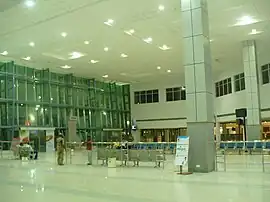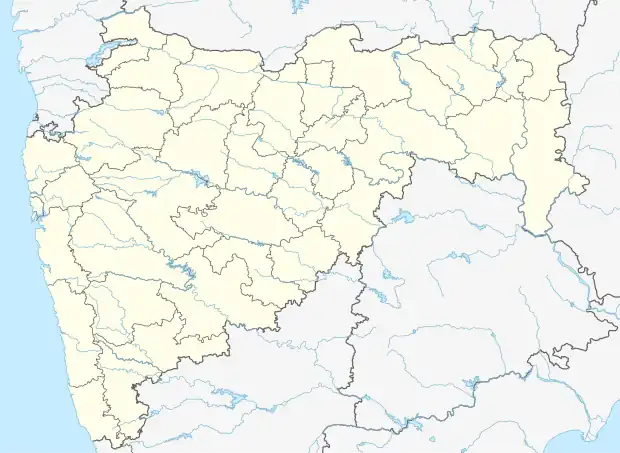Dr. Babasaheb Ambedkar International Airport
Dr. Babasaheb Ambedkar International Airport (IATA: NAG, ICAO: VANP) is an international airport serving the city of Nagpur, Maharashtra, India. The airport is located at Sonegaon, 8 km (5 mi) southwest of Nagpur. The airport covers an area of 1,355 acres (548 hectares). In 2005, it was named after B. R. Ambedkar,[4] the chief architect of the Constitution of India and one of the founding fathers of the Republic of India. The airport handles around 8,500 passengers per day and caters to four domestic airlines and two international airlines connecting Nagpur to Sharjah, Doha, and 14 domestic destinations. The airport spread over 1,460 acres is also home to Nagpur Air Force Station of the Indian Air Force. Growth in passenger traffic is fuelled by passengers traveling to and from the state capital Mumbai, located over 700 km (378 mi) away. The airport has one terminal and has two aerobridges.
Dr. Babasaheb Ambedkar International Airport | |||||||||||
|---|---|---|---|---|---|---|---|---|---|---|---|
 | |||||||||||
| Summary | |||||||||||
| Airport type | Public | ||||||||||
| Owner | Airports Authority of India | ||||||||||
| Operator | GMR Group & MIHAN India Private Limited (MIPL) | ||||||||||
| Serves | Nagpur | ||||||||||
| Location | Sonegaon, Nagpur, Maharashtra | ||||||||||
| Focus city for | |||||||||||
| Elevation AMSL | 315 m / 1,033 ft | ||||||||||
| Coordinates | 21°05′32″N 79°02′50″E | ||||||||||
| Map | |||||||||||
 NAG  NAG | |||||||||||
| Runways | |||||||||||
| |||||||||||
| Statistics (April 2022 - March 2023) | |||||||||||
| |||||||||||
History
The airport was commissioned during the First World War in 1917-18 for the RFC/RAF. The old buildings were renovated during the Second World War, when it was used as a staging airfield by the Royal Air Force (RAF). It was transferred to the Indian Government when the British left. Due to brisk traffic, new terminal buildings featuring facilities of refreshment, retiring rooms, restrooms, book stalls and visitor's galleries were constructed in 1953.[5]
Sonegaon Airport was the hub of the unique "Night Air Mail Service" wherein four planes left from Delhi, Bombay, Calcutta and Madras every night with a mail load from their region and returned to their home base in the early morning, after exchanging the mail at Nagpur. The service was operated from January 1949 until October 1973.[6] Over the years its major traffic was civilian aircraft till the formation of 44 Wing and the transfer of the Il-76 military transport aircraft of the IAF in 2003.[7] In the 2010s, the airport was in danger of losing its operating license due to danger at the airport. A former Atlanta Skylarks Boeing 720 owned by Continental Aviation Limited, which had been abandoned at the airport since 1991, was sitting 90 meters from the runway, when the rules state that any object should be situated at least 150 meters from the runway. In 2015–2016, the aircraft, which by then had been standing there for nearly 30 years, was moved to the northeast end of the airport, 600 meters away from the runway.[8][9]
Expansion
It is slated to be the Multimodal International Hub Airport and development work started in 2005. The plan involves the construction of a second runway, a new terminal building and a cargo complex through a build-operate-transfer basis. The Maharashtra government offered 400 hectares of land to the Indian Air Force (IAF) in exchange of 278 hectares of land occupied by Air Force Station, Nagpur.[10][11]
The new Integrated Terminal Building was inaugurated on 14 April 2008. The Airports Authority of India (AAI) modified and upgraded the existing building at the cost of ₹790 million (US$9.9 million). It covers an area of 17,500 square metres and has the capacity to handle 550 arriving and departing passengers during peak hours. The new terminal building has 20 check-in counters and 20 immigration counters. The terminal is equipped with facilities such as passenger bridges with visual docking guidance system and baggage conveyor system. A car park to accommodate 600 cars at a time has been built. Eight new parking bays were added to take the number of bays to 18. For improving city-side connectivity, a new approach road to connect the terminal building with the main highway has been constructed. To improve the navigation facilities at Nagpur Airport, AAI plans to construct a new control tower and technical block with all modern CNS ATM facilities.[12]
Air India maintenance-repair-overhaul
A maintenance-repair-overhaul facility, built by the American aircraft manufacturer Boeing, occupies 50 acres of land at the airport. Construction began in January 2011.[13] Air India's maintenance-repair-overhaul unit, called Air India Engineering Services, which was hived into a separate company in 2013, will start operating the maintenance-repair-overhaul facility by June 2015.[14] The $100 million project is part of a deal between Air India and Boeing and has two 100 x 100-metre hangars, constructed by Larsen & Toubro, to accommodate wide-body aircraft like Boeing 777 and 787-8 and another 24,000 sq metres area for allied work. Nagpur was chosen for the project because of its central location and its high temperatures, favourable for aircraft manufacturing, as they are away from corrosion and sea water contamination. The greenfield project is Boeing's second in the world after Shanghai in China.[15]
Metro Access from Airport
The airport now has access to Nagpur Metro.
Airlines and destinations
| Airlines | Destinations |
|---|---|
| Air Arabia | Sharjah |
| Air India | Mumbai |
| IndiGo | Ahmedabad, Bangalore, Chennai (ends 28 October 2023), Delhi, Goa–Mopa,[16] Hyderabad, Indore, Kolkata, Lucknow,[17] Mumbai, Nashik,[16] Pune |
| Qatar Airways | Doha |
| Star Air | Belgaum,[18] Hyderabad,[19] Kishangarh[19] |
See also
References
- "Annexure III – Passenger Data" (PDF). aai.aero. Retrieved 24 April 2023.
- "Annexure II – Aircraft Movement Data" (PDF). aai.aero. Retrieved 24 April 2023.
- "Annexure IV – Freight Movement Data" (PDF). aai.aero. Retrieved 24 April 2023.
- "Nagpur Airport being renamed". The Hindu. 15 October 2005. Archived from the original on 28 December 2005. Retrieved 3 March 2012.
- "Nagpur District Gazetteer - 1966". Archived from the original on 10 April 2009. Retrieved 3 March 2012.
- "Indian Postal History 1947-1997". Archived from the original on 16 February 2012. Retrieved 3 March 2012.
- "Warbirds of India — Nagpur". Archived from the original on 4 March 2016. Retrieved 20 February 2012.
- Arya, Shishir (30 September 2015). "Abandoned plane gets a new resting place". The Times of India. Retrieved 16 March 2021.
- "The Story Of A Guy's Dad's Junkyard Airplane Abandoned At An Indian Airport Is Fascinating". Jalopnik. Retrieved 13 October 2021.
- "Transfer of Land to Mihan Project, Nagpur". Press Information Bureau, Government of India. 24 August 2011. Retrieved 20 February 2012.
- "Navi Mumbai, Pune, Nagpur Airport projects to take off". The Hindu Business Line. 13 November 2013. Retrieved 13 November 2013.
- "New Terminal building of Nagpur Airport to be Inaugurated on 14th April 2008". Press Information Bureau, Government of India. 11 April 2008. Retrieved 20 February 2012.
- "Boeing's Nagpur MRO facility to start operations in Q2 2013". FlightGlobal. 11 December 2012. Retrieved 17 February 2013.
- "Boeing: Nagpur MRO unit to be operational by April-June 2015". The Financial Express. 22 December 2014. Archived from the original on 29 December 2014. Retrieved 29 December 2014.
- "Boeing MRO facility work at Nagpur airport to end by 2012". DNA. 25 May 2011. Retrieved 20 February 2012.
- "INDIGO 1H23 DOMESTIC ROUTES ADDITION SUMMARY – 05MAR23". Aeroroutes. Retrieved 7 March 2023.
- https://www.goindigo.in/information/new-flights.html
- Star Air [@OfficialStarAir] (19 March 2022). "Star Air is excited to launch its newest flight destination" (Tweet). Retrieved 19 March 2022 – via Twitter.
- Velani, Bhavya (21 September 2023). "Star Air Announces the New Flights from Nagpur". Aviation A2Z. Retrieved 21 September 2023.